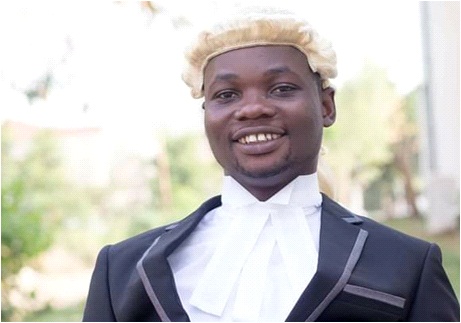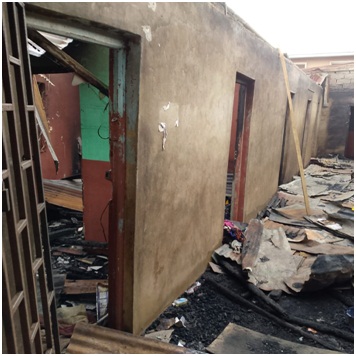Divorce: Who takes custody of the children?
By Runsewe Solomon & Damilola Akinmolayan
|
A major factor in deciding who gets custody of a child after a divorce is the determination of who the primary caretaker is. The Hope Classics spoke with some legal practitioners and some personalities on the matter. Excerpts:

When marriages stand on the brink of collapse, attention is given to the irreconcilable differences between couples. Needless time and effort are spent on pre-litigious considerations. This is sometimes at the expense of the total wellbeing of the children of the marriage. Couples seeking a Decree of Order Nisi for a Judicial Separation, Nullity or a Dissolution of Marriage tend to be more engrossed in the legal burden of proving that the marriage “has broken down irretrievably,” so that the children of the marriage, who are often viewed as the spoils of war in the circumstance, are left uncared for, and if at all, inadequately catered for.
The Matrimonial Causes Act, Cap. M7, Laws of the Federation of Nigeria, 1970 (the “Act”), Part IV, Section 69 defines “Marriage” for the purpose of Maintenance, Custody and Settlement to include the following children of a marriage:
(a) Adopted children by either or both husband and wife.
(b) Any child born before the marriage, whether legitimated by the marriage or not.
(c) Any child (including an illegitimate child of either of them and adopted by either of them) if, “at the relevant time”, the child was already a member of the household of the husband and wife.
It is worthy of note that the legitimacy or otherwise of a child of a marriage as contemplated by the Act appears to be inconsistent with Section 42 (2) of the Constitution of the Federal Republic of Nigeria, 1999 (as amended) which provides that “No citizen of Nigeria shall be subjected to any disability or deprivation merely by reason of the circumstances of his birth.”
This apparent inconsistency will have the effect of holding the above provisions of the Act void to the extent of their inconsistencies with the constitution- Section 1 (3) of the 1999 Constitution (as amended). It can therefore be argued that for the purpose of determining the legitimacy and otherwise of a child entitled to maintenance, welfare and so on, a child cannot be disadvantaged “by reason of the circumstances of his birth” anymore.
The law lays out the persons deemed to be children of a marriage but it does not give the same clarity as to maintenance, welfare and education of the children without a pending divorce or judicial separation proceedings in court.

It is in this regard that divorce must always be the last resort and even where it is the last resort, the child is not immune against the consequences. In most cases, when couples decide to go their separate ways, they deliberately or negligently involve their children in their crisis or enlist them as a tool of revenge to get back at each other.
We have seen instances where an estranged spouse incited the children in their custody against the other. There are people who also abandon the children to one estranged spouse.
In a divorce, there are three fundamental legal issues when it comes to children and their parents. Parents are responsible for custody, access and the children’s upkeep. It is important to note that both parties cannot have custody, which means where one has custody the other has access. It is also important to note that an estranged spouse may not be granted custody, but he/she must not be denied access, which can be regulated, for example, supervised visit.
The children’s upkeep is also the responsibility of both parties in accordance with the agreement before an adjudicating body or a court of law.
From my experience, estranged couples are not always magnanimous, either in victory or defeat. Often, couples become very bitter and they use their children to get back at each other by denying access, custody and refusal to take responsibility for the children’s upkeep.
We have seen instances where an estranged spouse changed the children’s school without the other party’s awareness, and has left standing instructions in the new school that the other party be not granted access to the children.”
But shouldn’t relevant authorities ensure enforcement and compliance with court orders and judgment with regards to children’s custody and upkeep?
It is important to note, however, that the greatest tool of enforcement is for the estranged parties to know that their children are already traumatised by the experience of their own crisis, because no child should be raised in a troubled home (a child is anybody below 18).
That their relationship did not work for whatever reason is not the children’s fault. So, even if they are not repentant towards each other, they must in repentance do everything within their power to protect the children from the negative impact of divorce, instead of deliberately or negligently involving them.

First of all we really need to stop thinking in terms of ‘ownership’ of children. Children are not chattels. You do not own a child. They are little people. Dependent little people and adults are parents, guardians, care takers and providers. Not owners.
That said what people usually mean when they ask that question is who gets ‘custody’ when the parents of a child are separated, divorced or even never married. Or who the child lives with because the parent a child lives with will influence the child’s future behaviour and personality.
Both parents have an equal right to raise, influence and make decisions for their juvenile offspring.
Where the parents are cohabiting there is no usually issue and in many households the father assumes the role of head of household and makes decisions for everyone else with or without consulting his wife, the mother. It all depends on their personal dynamics.
Custody issues arise where either party wants to leave or end the relationship between the parents of a child or children.
Both the Matrimonial Causes Act and the Child’s Right Act are clear that issues of custody are to be decided in the best interest of the child and the courts have held that neither parent has an automatic right to custody.
If you are in a statutory marriage (that is one registered at the Marriage Registry and issued a Federal Government Certificate) and want a divorce, judicial separation or nullification of that marriage and believe that the best interest of the children is served with you or a woman in a violent abusive marriage that stays because you won’t leave without your children here is what your lawyer needs to do;
Either party to a matrimonial petition can apply for an interlocutory order for custody.
The court will seek to determine what is in the best interest of the child and will consider the child’s age, gender, special needs, living environment, child care arrangements, plans to further the education of the child, financial ability of parent proposing arrangements, and the parents temperament and lifestyle. However, financial privilege alone is not enough determinant of a child’s best interest.

The marriage that brought about the birth of a child notwithstanding, the custody of a child in Nigeria is managed under the Child Rights Act or the respective Child Rights Laws of states in Nigeria. Also, whether a child is born under any form of marriage or not, the custody of the child is regulated by the above-mentioned laws. Every custody matter must be resolved by a court of law (Magistrate or High Court) having in mind the best interest and welfare of the child.
So, any institution, person, office, group or court that is to decide the custody of a child “the best interest of the child shall be primary consideration.” Even a Customary Court that can terminate a customary marriage according to customs and customary law, cannot decide custody of a child without having in mind the best interest and welfare of the child as stipulated in the Child Rights Act or the Child Rights Laws.
Hence, a couple married under traditional marriage can determine the custody of their child/children by approaching a Customary Court, Magistrate Court or High Court with an application for custody. This may lead to sole custody (only one parent has the full custody of the child) or joint custody (both parents have the shared custody of their child).
The argument that under customs and customary laws, that fathers must take custody of their children (especially, their male children) is rubbish and does not apply in any part of Nigeria. It is the parent that will protect and provide for the best interest and welfare of a child that will be granted the custody of a child. And, both parents of a child have equal rights over their child. Custody of a child is not a customary issue, even where the child is born under a customary marriage, rather it is a Child Rights issue and only the courts have the final say on such.

In many Nigerian patriarchal cultures, women bear and raise children but the children ‘belong’ to the man. This is hinged on the overarching principle of customary law that denies a mother’s lineage and strongly upholds patrilineage. If the couple divorce, the mother leaves the children for the ‘owner’ – the father. These religious and cultural traditions influence the awarding of child custody in sharia and customary courts.
In custody matters, Nigeria’s Matrimonial Causes Act considers factors like an emotional attachment to a particular parent; the degree of familiarity and wishes of the child; and adequacy of facilities. It also looks at the respective incomes of the parties; whether one of the parties lives with a third party; the child’s age and sex; opportunities for a proper upbringing; and the conduct of the parties. The custody of children after divorce may be joint or to one party with a visitation right to the other. It’s not awarded on the basis of who is guilty of the matrimonial offence.
Unlike some societies where most divorce petitions are granted on no-fault grounds, all the divorce cases in this analysis were on fault grounds. The reasons varied according to gender. Neglect of the wife’s and children’s welfare, poverty and domestic violence were the common reasons women gave for seeking divorce. The two men who sought divorce gave reasons of insubordination, adultery and an uncaring attitude to the children and the man.
Sole custody was granted to the man in six cases. Joint custody was granted in five cases. In four of those five, the custody of the child awarded to the woman was temporary because the child was underage or the man had no income. Sole custody to the woman was granted in only one of the 12 cases. This is unlike more developed countries where women usually get sole custody or shared custody.
We observed that custody was awarded to the man in almost all cases, even when the divorce petition was on the ground of lack of proper care by the man for the children. This suggests that the child’s interest is secondary under the customary law. Instead, the main concern is the men’s right to the children. This infringes on the right of women to their children and the right of children to be cared for. It is also a tacit encouragement of child abuse and neglect.
Culture should not be upheld to the detriment of human welfare. The welfare of children should be the main guide in the award of child custody after divorce. The woman’s rights to her children are equal to the man’s, if not greater. Her right to live with her children should get due attention in all judgements on child custody after divorce.

Custody is an aspect to be given thorough consideration; it must be critically looked into. Custody can either go to the man or woman and it can be jointly. It must be given the paramount and dominant consideration, must not be based on sentiment because the life or lives of the children is or are at stake.
Custody will not come to play until there is the issue of divorce
Section 7 of the Matrimonial Causes Act established the fact that it is the welfare of the children that must be given adequate and proper thought in determining who must be given custody of the children.
However, in the recent time, parental rights to have custody of their children are now shared between the husband and wife. The foremost thing to be considered is the welfare and the interest of the child
FACTORS TO BE CONSIDERED IN AWARDING CUSTODY
How responsible the custodian is, this is so crucial because as the popular saying goes thus: charity begins at home, home is so critical in the training of any child.
Financial capacity is another salient point to be considered.
Relationship between the child in question and the person willing to take custody.
The wish or desire of the child.
Age of the child is also important.
The marriage status of the parent.
The parent who is staying presently with the children should take custody.










